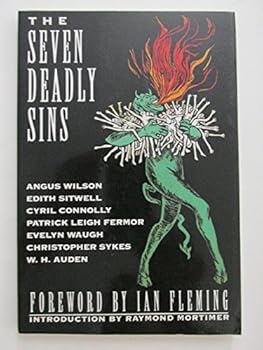Seven Deadly Sins
Select Format
Select Condition 
Book Overview
A diverting, delightful, surprising treasury. With a new Introduction by Alain de Botton. This description may be from another edition of this product.
Format:Paperback
Language:English
ISBN:0688116132
ISBN13:9780688116132
Release Date:August 1992
Publisher:Harper Perennial
Length:87 Pages
Weight:0.75 lbs.
Dimensions:0.4" x 5.7" x 8.3"
Related Subjects
Anthologies & Literary Collections Contemporary Criticism & Theory Essays Essays & Correspondence Fiction General History & Criticism Humor Humor & Entertainment Humorous Literary Literary Criticism & Collections Literature Literature & Fiction Parodies Religion Religion & SpiritualityCustomer Reviews
1 rating
What seven sins and the pursuit of happiness have in common
Published by Thriftbooks.com User , 22 years ago
Sins are definitely out of fashion. The last time I came across the Seven Deadly Sins of Envy, Pride, Covetousness, Gluttony, Sloth, Lust and Anger, it was in a glossy Singaporean magazine for the trendy crowd. Under each of the headings it featured big cars, expensive condos, the current "IN"-nightspots, the newest restaurants, fashionable jewelry, designer clothes and so on. The word "sin" may have made monks and Victorians tremble; but we just shiver in anticipation of the latest thrill. Alain de Botton captures this change in attitude perfectly in his 5-page afterword: "[Today] our concerns are of a different order. We worry about whether we are cheerful or depressed, fulfilled or low in self-esteem. We worry about happiness, not sin and virtue.""The Seven Deadly Sins" have originally been published in 1962 by The Sunday Times, and authors from England have written all seven contributions. The book does not rank the sins in any order (rankings are a very American obsession, and it seems the English have not been infected yet in the early sixties). However, it is very fitting for our democratic society to begin with ENVY, Angus Wilson's contribution, and to end the book with ANGER, W. H. Auden's contribution. Envy is the quintessential democratic "sin." Alain de Botton reflects that "envy comes from comparison and [...] the habit for everyone to compare themselves to everyone else is a particularly modern, democratic one." People envy only those who they feel themselves to be like: "There are few successes more unendurable than those of our closest friends [and] it follows that the more people we take to be our equals, the more we will be at risk of dissatisfaction." Which explains why a society of equals does not automatically lead to more happiness for its individual members. Anger is also a very democratic "sin" because anger tends to arise from a sense of entitlement: "We aren't overwhelmed by anger whenever we are denied an object we desire, only when we believe ourselves entitled to obtain it" (Alain de Botton). A sense of entitlement comes with democracy: we are not just in pursuit of happiness, we assume we are entitled to it.Wedged between the highlights of Wilson's and Auden's articles are contributions by Edith Sitwell on PRIDE (a tongue-in-cheek confession to the "virtue" of pride), Cyril Connolly on COVETOUSNESS (a very funny short story about obsessive greed), Patrick Leigh-Fermor on GLUTTONY (an indigestible, rambling piece of writing - skip this part of the menu!), Evelyn Waugh on SLOTH ("Sloth is the condition in which a man is fully aware of the proper means of his salvation and refuses to take them," the state of rejecting the "spiritual good" which - in modern parlance - leads to depression, the contemporary cousin of sloth), and finally Christopher Sykes on LUST (a fine example of British common sense).If we worry about happiness, not sin and virtue, why should we read about "The Seven Deadly Sins" at all? Why worry about






